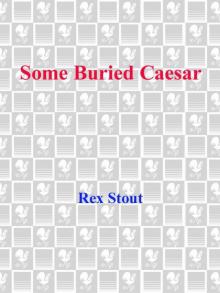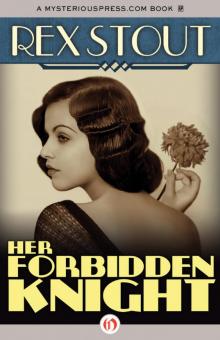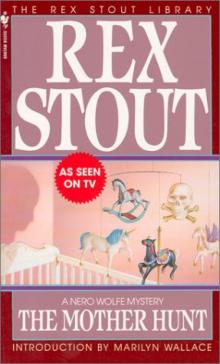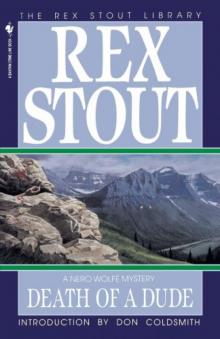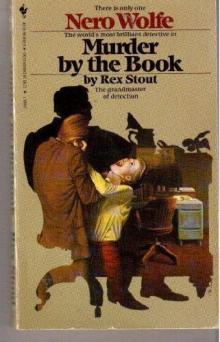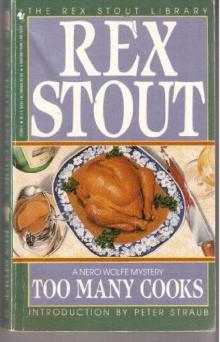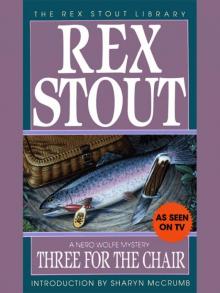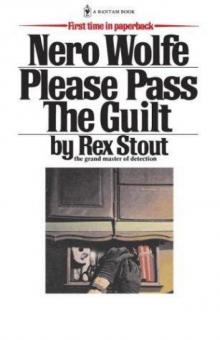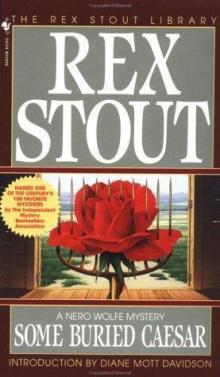Some buried caesar nero.., p.1
Some Buried Caesar (Nero Wolfe Mysteries), page 1





This book is fiction. No resemblance is intended
between any character herein and any person,
living or dead; any such resemblance is
purely coincidental.
SOME BURIED CAESAR
A Bantam Crime Line Book / published by arrangement with
the author’s estate
PUBLISHING HISTORY
Bantam edition / January 1982
Bantam reissue edition / June 1994
CRIME LINE and the portrayal of a boxed “cl” are trademarks of Bantam Books, a division of Random House, Inc.
All rights reserved.
Copyright 1938, 1939, 1967 by Rex Stout.
Introduction copyright © 1994 by Diane Mott Davidson.
Cover copyright © 1994 by Tom Hallman.
No part of this book may be reproduced or transmitted in any form or by any means, electronic or mechanical, including photocopying, recording, or by any information storage and retrieval system, without permission in writing from the publisher.
For information address: Bantam Books
eISBN: 978-0-307-75619-0
Published simultaneously in the United States and Canada
Bantam Books are published by Bantam Books, a division of Random House, Inc. Its trademark, consisting of the words “Bantam Books” and the portrayal of a rooster, is Registered in U.S. Patent and Trademark Office and in other countries. Marca Registrada, Bantam Books, 1540 Broadway, New York, New York 10036
v3.1
Contents
Cover
Title Page
Copyright
Introduction
Chapter 1
Chapter 2
Chapter 3
Chapter 4
Chapter 5
Chapter 6
Chapter 7
Chapter 8
Chapter 9
Chapter 10
Chapter 11
Chapter 12
Chapter 13
Chapter 14
Chapter 15
Chapter 16
Chapter 17
Chapter 18
Chapter 19
Chapter 20
Chapter 21
The World of Rex Stout
Other Books by This Author
About the Author
Introduction
What some people will do for publicity. In the realm of food, you can make a Guinness record–defying submarine sandwich or pepperoni pizza. Or, in the case of Thomas Pratt, owner of a string of 1930s-vintage fast-food restaurants known as pratterias, you can propose to barbecue a prizewinning bull. To spend $45,000 on a piece of beef that will serve only 100 people, explains the enterprising Pratt to an unamused Nero Wolfe and a goggling Archie Goodwin, is not only an efficient way to spend money that would otherwise go to ineffectual newspaper advertising, it also makes psychological sense:
Look here. Do you realize what a stir it will make that the senior grand champion Guernsey bull of the United States is being barbecued and served in chunks and slices to a gathering of epicures? And by whom? By Tom Pratt of the famous pratterias! Let alone the publicity, do you know what the result will be? For weeks and months every customer that eats a roast beef sandwich in a pratteria will have a sneaking unconscious feeling that he’s chewing a piece of Hickory Caesar Grindon! That’s what I mean when I say psychology.
But psychology has a tendency to run amuck, as do both people and sedans. Stranded at the Pratt house in upstate New York owing to an unforeseen encounter between their car and a tree, the immense, unflappable Nero Wolfe and his smart-mouth assistant, Archie Goodwin, have to remake both housing and transportation plans on their expedition to exhibit Wolfe’s orchids at the fair in nearby Crowfield. In the process, they land in the middle of a not-so-neighborly altercation between Guernsey League officials, longtime stockmen, and Pratt. Infuriated at Pratt’s plan for Hickory Caesar Grindon, the stockmen cajole, threaten, insult, and even propose a dangerous wager in order to save Caesar. So heated is their conflict that a character from the sixties might observe, “Hey! Don’t have a cow, man.”
But of course that is the point: despite the many remonstrances, the cow will be had. And this being the thirties rather than the sixties, the demonstration ends there. The various characters skulk off concocting complicated designs to fulfill their passions: amorous, financial, and bovine. There is the female golf champion (“one of those,” Archie uncharitably observes), formerly engaged to one of the feuding neighbors, who in his turn is now smitten with a Pratt houseguest, who has in her turn begun to lavish her attentions on an unreluctant Archie. The female golf champion is willing to pay Archie the cost of lunch to keep the houseguest away from her brother, Jimmy Pratt. (And the cost of the lunch for two people in 1938? Two dollars, which will not quite get you a cup of cappuccino in 1994, much less a biscotto to go with it.) There is the big-boned stockman who, after his herd was virtually destroyed by anthrax, sold Caesar to Tom Pratt, but only with great sadness (“I was up all night the day he was dropped—he sucked these fingers when he was only six hours old.”). And there is the love-smitten, bet-proffering neighbor, also an expert stockman. He is accompanied by a suspicious-looking city slicker friend, who persists in presenting himself as the model of sartorial perfection in a Crawnley suit and Monteith tie, despite the fact that this is, after all, the country.
Unfortunately, the country is immune to neither bizarre couture nor evil. When first one and then another murder occurs, Nero Wolfe diverts himself from attending to his precious orchids (prizewinning albinos) and rouses himself (but not much) to apply logic and observation, and some sleight of hand, to the solution. When pursuit of the murderer leads him out to the Crowfield fair, Nero Wolfe fortifies himself with regular trips to the Methodist tent, where the followers of John Wesley are making quite a name (and a pretty penny) for themselves with their excellent chicken fricassee and dumplings. Archie manages to maintain, albeit tenuously, his love interest, while fooling the smarter-than-expected rural police, who suspect he is hiding evidence. Despite his quick hand, quick brain, and even quicker mouth, Archie ends up in the Crowfield County jail, where he amuses himself by forming the Crowfield County Prisoners’ Union, complete with a much-disputed list of demands.
The solution to this delightfully complicated plot comes at last, and just in time for Nero’s and Archie’s safe deliverance from the perils of upstate New York. For those still hungering for a barbecue at book’s end, I offer a recipe for beans to go with your ribs. Serve them with potato salad, rolls, corn, coleslaw, and rich, fudgy, homemade brownies—all essential components of a true all-American barbecue. While Archie would undoubtedly refer to a side dish as “a cute number sitting on the bench,” and refer the cooking of beans to Fritz, I found the best recipe for a bean dish from Tom and Enid Schantz of the Rue Morgue mystery bookstore in Boulder, Colorado. Enjoy, and don’t let anybody give you any bull.
RUE MORGUE BEANS WITH BACON
8 slices bacon
1 15-ounce can pinto beans, drained
1 15-ounce can kidney beans, drained
1 15-ounce can garbanzo beans, drained
1 28-ounce can baked beans, including sauce (recommended brand: B & M)
4 cups onions, quartered and thinly sliced (about 2 large onions)
½ cup dark corn syrup
¼ cup cider vinegar
1 tsp. dry mustard
Cook bacon, drain, and cut into 1-inch slices. Combine bacon and rest of ingredients in Dutch oven on top of stove. Simmer uncovered for 2 hours, stirring every 15 minutes, until sauce is slightly reduced and onions are completely cooked. Serves 8.
—Diane Mott Davidson
Chapter 1
That sunny September day was full of surprises. The first one came when, after my swift realization that the sedan was still right side up and the windshield and windows intact, I switched off the ignition and turned to look at the back seat. I didn’t suppose the shock of the collision would have hurled him to the floor, knowing as I did that when the car was in motion he always had his feet braced and kept a firm grip on the strap; what I expected was the ordeal of facing a glare of fury that would top all records; what I saw was him sitting there calmly on the seat with his massive round face wearing a look of relief—if I knew his face, and I certainly knew Nero Wolfe’s face. I stared at him in astonishment.
He murmured, “Thank God,” as if it came from his heart.
I demanded, “What?”
“I said thank God.” He let go of the strap and wiggled a finger at me. “It has happened, and here we are. I presume you know, since I’ve told you, that my distrust and hatred of vehicles in motion is partly based on my plerophory that their apparent submission to control is illusory and that they may at their pleasure, and sooner or later will, act on whim. Very well, this one has, and we are intact. Thank God the whim was not a deadlier one.”
“Whim hell. Do you know what happened?”
“Certainly. I said, whim. Go ahead.”
“What do you mean, go ahead?”
“I mean go on. Start the confounded thing going again.”
I opened the door and got out and walked around to the front to take a look. It was a mess. After a careful examination I went back to the other side of the car and opened the rear door and looked in at him and made my report.
“It was quite a whim. I’d like to get it on record what happened, since I’ve been driving y
“How long will it take you to fix it?”
“I can’t fix it. If I had a nail I wouldn’t even bother to bite it, I’d swallow it whole.”
“Who can fix it?”
“Men with tools in a garage.”
“It isn’t in a garage.”
“Right.”
He closed his eyes and sat. Pretty soon he opened them again and sighed. “Where are we?”
“Two hundred and thirty-seven miles northeast of Times Square. Eighteen miles southwest of Crowfield, where the North Atlantic Exposition is held every year, beginning on the second Monday in September and lasting—”
“Archie.” His eyes were narrowed at me. “Please save the jocularity. What are we going to do?”
I admit I was touched. Nero Wolfe asking me what to do! “I don’t know about you,” I said, “but I’m going to kill myself. I was reading in the paper the other day how a Jap always commits suicide when he fails his emperor, and no Jap has anything on me. They call it seppuku. Maybe you think they call it hara-kiri, but they don’t or at least rarely. They call it seppuku.”
He merely repeated, “What are we going to do?”
“We’re going to flag a car and get a lift. Preferably to Crowfield, where we have reservations at a hotel.”
“Would you drive it?”
“Drive what?”
“The car we flag.”
“I don’t imagine he would let me after he sees what I’ve done to this one.”
Wolfe compressed his lips. “I won’t ride with a strange driver.”
“I’ll go to Crowfield alone and rent a car and come back for you.”
“That would take two hours. No.”
I shrugged. “We passed a house about a mile back. I’ll bum a ride there or walk, and phone to Crowfield for a car.”
“While I sit here, waiting, helplessly, in this disabled demon.”
“Right.”
He shook his head. “No.”
“You won’t do that?”
“No.”
I stepped back around the rear of the car to survey the surroundings, near and far. It was a nice September day, and the hills and dales of upstate New York looked sleepy and satisfied in the sun. The road we were on was a secondary highway, not a main drag, and nothing had passed by since I had bumped the tree. A hundred yards ahead it curved to the right, dipping down behind some trees. I couldn’t see the house we had passed a mile or so back, on account of another curve. Across the road was a gentle slope of meadow which got steeper further up where the meadow turned into woods. I turned. In that direction was a board fence painted white, a smooth green pasture, and a lot of trees; and beyond the trees were some bigger ones, and the top of a house. There was no drive leading that way, so I figured that there would be one further along the road, around the curve.
Wolfe yelled to ask what the devil I was doing, and I stepped back to the car door.
“Well,” I said, “I don’t see a garage anywhere. There’s a house across there among those big trees. Going around by the road it would probably be a mile or more, but cutting across that pasture would be only maybe 400 yards. If you don’t want to sit here helpless, I will, I’m armed, and you go hunt a phone. That house over there is closest.”
Away off somewhere, a dog barked. Wolfe looked at me. “That was a dog barking.”
“Yes, sir.”
“Probably attached to that house. I’m in no humor to contend with a loose dog. We’ll go together. But I won’t climb that fence.”
“You won’t need to. There’s a gate back a little way.”
He sighed, and bent over to take a look at the crates, one on the floor and one on the seat beside him, which held the potted orchid plants. In view of the whim we had had, it was a good thing they had been secured so they couldn’t slide around. Then he started to clamber out, and I stepped back to make room for him outdoors, room being a thing he required more than his share of. He took a good stretch, his applewood walking stick pointing like a sword at the sky as he did so, and turned all the way around, scowling at the hills and dales, while I got the doors of the car locked, and then followed me along the edge of the ditch to the place where we could cross to the gate.
It was after we had passed through, just as I got the gate closed behind us, that I heard the guy yelling. I looked across the pasture in the direction of the house, and there he was, sitting on top of the fence on the other side. He must have just climbed up. He was yelling at us to go back where we came from. At that distance I couldn’t tell for sure whether it was a rifle or a shotgun he had with the butt against his shoulder. He wasn’t exactly aiming it at us, but intentions seemed to be along that line. Wolfe had gone on ahead while I was shutting the gate, and I trotted up to him and grabbed his arm.
“Hold on a minute. If that’s a bughouse and that’s one of the inmates, he may take us for woodchucks or wild turkeys—”
Wolfe snorted. “The man’s a fool. It’s only a cow pasture.” Being a good detective, he produced his evidence by pointing to a brown circular heap near our feet. Then he glared toward the menace on the fence, bellowed “Shut up!” and went on. I followed. The guy kept yelling and waving the gun, and we kept to our course, but I admit I wasn’t liking it, because I could see now it was a shotgun and he might easily be the kind of a nut that would pepper us.
There was an enormous boulder, sloping up to maybe 3 feet above the ground, about exactly in the middle of the pasture, and we were a little to the right of that when the second surprise arrived in the series I spoke of. My attention was pretty thoroughly concentrated on the nut with the shotgun, still perched on the fence and yelling louder than ever, when I felt Wolfe’s fingers gripping my elbow and heard his sudden sharp command:
“Stop! Don’t move!”
I stopped dead, with him beside me. I thought he had discovered something psychological about the bird on the fence, but he said without looking at me, “Stand perfectly still. Move your head slowly, very slowly, to the right.”
For an instant I thought the nut with the gun had something contagious and Wolfe had caught it, but I did as I was told, and there was the second surprise. Off maybe 200 feet to the right, walking slowly toward us with his head up, was a bull bigger than I had supposed bulls came. He was dark red with white patches, with a big white triangle on his face, and he was walking easy and slow, wiggling his head a little as if he was nervous, or as if he was trying to shake a fly off of his horns. Of a sudden he stopped and stood, looking at us with his neck curved.
I heard Wolfe’s voice, not loud, at the back of my head, “It would be better if that fool would quit yelling. Do you know the technique of bulls? Did you ever see a bull fight?”
I moved my lips enough to get it out: “No, sir.”
Wolfe grunted. “Stand still. You moved your finger then, and his neck muscles tightened. How fast can you run?”
“I can beat that bull to that fence. Don’t think I can’t. But you can’t.”

